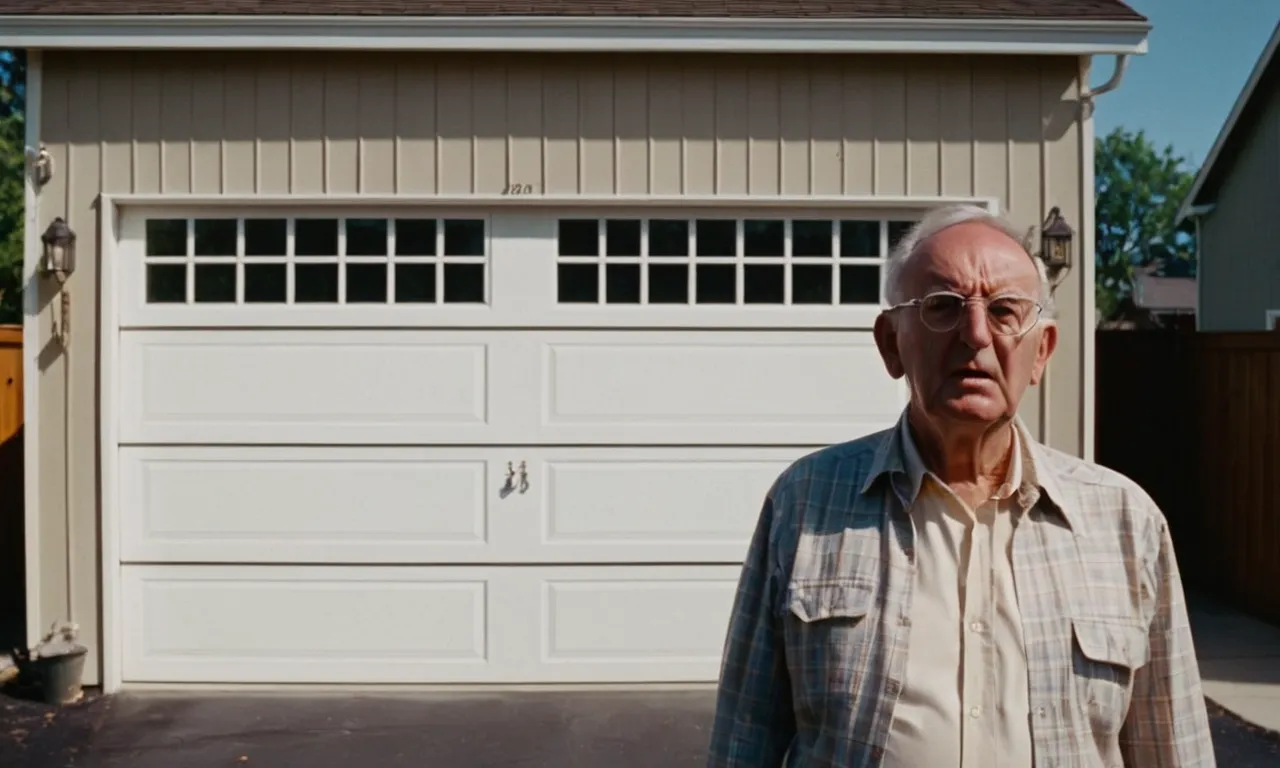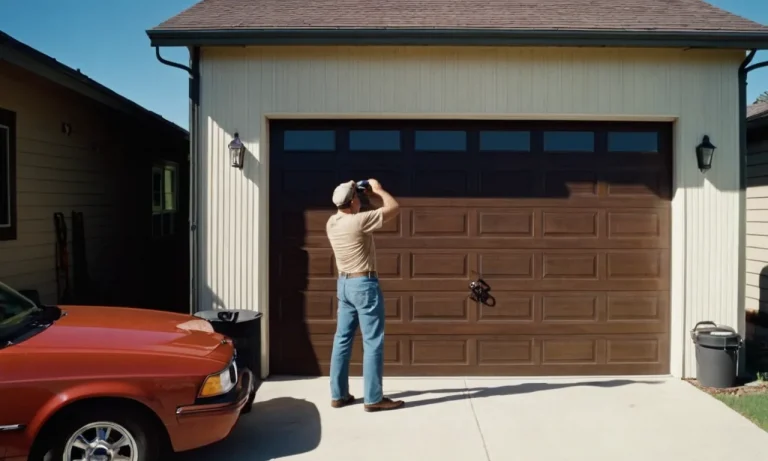Why Is My Electric Garage Door So Fickle?
Has your electric garage door been acting up lately, opening and closing at random times or getting stuck halfway? Don’t worry, you’re not alone. Electric garage doors can be finicky and prone to issues if not properly maintained and operated.
If you’re short on time, here’s the quick answer to your question: electric garage doors commonly malfunction due to misalignment, track damage, broken springs, sensor problems, opener motor failure, or incorrect programming.
Keep reading to learn about these issues in detail and how to troubleshoot them.
In this comprehensive guide, we’ll explore the most common reasons an electric garage door acts fickle and doesn’t function smoothly. You’ll learn what causes these frustrating problems, how to diagnose the issue yourself, and when to call a professional garage door technician for repairs.
Garage Door is Out of Alignment
One common reason why your electric garage door might be acting fickle is that it is out of alignment. This means that the tracks, which guide the door as it opens and closes, are not properly aligned. When the tracks are misaligned, it can cause the door to become stuck or operate unevenly.
Bent Tracks
One possible cause of misalignment is bent tracks. Over time, the tracks can become damaged or bent due to various factors such as accidental impacts or regular wear and tear. When the tracks are bent, the garage door rollers may not be able to move smoothly along them.
This can cause the door to get stuck or operate in a jerky manner.
If you suspect that your garage door tracks are bent, it is best to call a professional to assess the situation. They will have the expertise and tools to safely straighten or replace the tracks, ensuring that your garage door operates smoothly once again.
Loose Hardware
Another potential cause of alignment issues is loose hardware. Over time, the nuts, bolts, and screws that hold your garage door together can become loose due to vibrations or regular use. When this happens, it can cause the tracks to shift out of alignment.
To check if loose hardware is the culprit, visually inspect the tracks, rollers, and other components of your garage door. Look for any signs of loose or missing screws, bolts, or nuts. If you notice any, tighten them using the appropriate tools.
However, it’s important to exercise caution and not overtighten, as this can cause further damage.
If tightening the hardware doesn’t solve the alignment issue, it’s best to consult a professional. They will be able to thoroughly inspect your garage door and make any necessary adjustments or repairs to ensure proper alignment.
Remember, attempting to fix alignment issues on your own can be dangerous, as garage doors are heavy and complex systems. It’s always best to leave it to the experts who have the knowledge and experience to handle the job safely.
Garage Door Tracks are Damaged
If you’ve noticed that your electric garage door has become fickle and unreliable, one of the reasons could be that the tracks are damaged. The tracks play a crucial role in guiding the door as it opens and closes, and any damage to them can cause the door to malfunction.
Dents
One common issue with garage door tracks is the presence of dents. These can occur due to accidental impacts with vehicles or other heavy objects. Even a small dent can disrupt the smooth movement of the door, causing it to get stuck or operate unevenly.
If you notice dents in your garage door tracks, it’s important to address the issue promptly. You can try using a rubber mallet to gently tap out the dents, but for more severe damage, it’s best to seek professional help.
They have the necessary tools and expertise to repair or replace the damaged tracks.
Bends
Bent tracks are another common cause of fickle electric garage doors. This can happen if the door gets forcefully closed or if it gets off track. Once the tracks are bent, the door may struggle to open or close smoothly, resulting in irregular operation.
Fixing bent tracks requires careful realignment to ensure that the door moves along the correct path. It’s important to note that attempting to straighten the tracks yourself can be risky, as it may cause further damage.
It’s best to consult a professional garage door technician who can assess the extent of the damage and provide the necessary repairs.
Loose Sections
Another issue that can make your electric garage door fickle is loose sections in the tracks. Over time, the bolts and screws holding the tracks together may become loose, causing the sections to shift out of alignment.
This can result in the door becoming unbalanced and struggling to operate smoothly.
If you suspect that loose sections are the culprit behind your fickle garage door, you can try tightening the bolts and screws yourself. However, be cautious not to overtighten, as this can strip the threads or damage the tracks. If the problem persists, it’s best to seek professional assistance.
Remember, maintaining the tracks of your electric garage door is crucial for its smooth operation. Regularly inspect the tracks for any signs of damage, and address them promptly to avoid further complications.
A well-maintained garage door track will ensure that your door operates smoothly and reliably for years to come.
Broken Garage Door Springs
One of the most common reasons for a fickle electric garage door is broken springs. Garage door springs are responsible for counterbalancing the weight of the door, making it easy to open and close. When these springs break, it can result in a variety of issues, including erratic door movement, difficulty in opening or closing the door, or even complete failure of the door to operate.
Extension Springs
Extension springs are typically found on garage doors that have a track running parallel to the ceiling. These springs stretch and contract as the door opens and closes. Over time, the constant tension and repeated use can cause these springs to weaken or break.
When an extension spring breaks, it can cause the garage door to become imbalanced and create a hazardous situation. It is important to address this issue promptly to avoid further damage or injury.
Torsion Springs
Torsion springs are another type of spring commonly used in garage doors. These springs are mounted on a metal shaft above the garage door and use torque to assist in lifting the door. Unlike extension springs, torsion springs do not stretch or contract.
Instead, they twist and unwind to create the necessary force. When a torsion spring breaks, it can cause the garage door to become extremely heavy and difficult to lift manually. This can put strain on the garage door opener and potentially lead to further damage.
It is important to note that garage door springs are under a significant amount of tension and can be dangerous to handle without proper knowledge and equipment. It is recommended to seek professional assistance when dealing with broken garage door springs.
If you are experiencing issues with your electric garage door, it is likely that broken springs are the culprit. Contact a reliable garage door repair service to assess the situation and provide the necessary repairs.
Ignoring the problem can lead to further damage and a complete failure of your garage door system.
Problems with Sensors
One of the common reasons why an electric garage door becomes fickle is due to problems with its sensors. These sensors play a crucial role in ensuring the safety and smooth operation of the door. When the sensors are not functioning properly, it can lead to various issues that can be frustrating for the homeowner.
Misaligned Sensors
One possible cause of sensor-related problems is misalignment. Over time, the sensors may shift out of their proper positions. This misalignment can occur due to vibrations or accidental bumps. When the sensors are misaligned, they may not be able to detect obstacles or properly communicate with the garage door opener.
As a result, the door may not open or close correctly, or it may even reverse unexpectedly. Adjusting the sensors and ensuring they are properly aligned can often resolve this issue.
Dirty Lenses
Another common problem with garage door sensors is dirty lenses. The sensors have small lenses that emit and receive beams of infrared light. These beams are used to detect objects in the path of the door. If the lenses become dirty or covered in dust, the sensors may not function correctly.
Cleaning the lenses with a soft cloth or cotton swab can often solve this issue. It is important to avoid using harsh chemicals or abrasive materials that could damage the lenses.
Faulty Wiring
Faulty wiring is yet another potential cause of sensor problems. Over time, the wires connecting the sensors to the garage door opener can become damaged or frayed. This can lead to intermittent connectivity issues, resulting in unpredictable behavior of the garage door.
In some cases, the wiring may need to be repaired or replaced to ensure proper functioning of the sensors.
It’s worth noting that problems with sensors are not uncommon, and they can often be resolved with some basic troubleshooting. However, if you are unsure about how to fix the issue or if the problem persists, it is recommended to seek professional assistance.
A trained technician can diagnose the problem accurately and provide the necessary repairs or replacements.
Garage Door Opener Motor Failure
One of the most common reasons for a fickle electric garage door is motor failure. The motor is responsible for providing the necessary power to lift and lower the door. When the motor fails, the door may not respond or may only partially open or close.
There are two main reasons why a garage door opener motor may fail: worn gears and a burnt-out motor.
Worn Gears
Over time, the gears in the garage door opener motor can become worn, causing them to slip or fail altogether. This can happen due to regular use, lack of maintenance, or exposure to extreme temperatures. When the gears are worn, the motor may struggle to lift the door or make grinding noises.
In some cases, the door may not move at all. It’s important to address worn gears as soon as possible to prevent further damage to the motor and ensure the smooth operation of your garage door.
Burnt-Out Motor
Another common cause of motor failure is a burnt-out motor. This can occur due to various reasons, such as excessive use, overloading, or power surges. When the motor burns out, it may stop working completely or struggle to function properly.
You may notice a burning smell, unusual noises, or the door not responding at all. It’s essential to replace a burnt-out motor to ensure the safe and efficient operation of your garage door.
If you’re experiencing issues with your electric garage door, it’s recommended to contact a professional garage door repair service. They will be able to diagnose the exact cause of the motor failure and provide the appropriate solution.
Regular maintenance and inspections can also help prevent motor failure and prolong the lifespan of your garage door opener.
Incorrect Programming
One of the reasons why your electric garage door may be acting fickle is due to incorrect programming. The settings and limits programmed into your garage door opener play a crucial role in its smooth operation.
If these settings are not properly adjusted, it can result in various issues and malfunctions.
Force Settings
Force settings determine how much force the garage door opener uses to open and close the door. If the force settings are too high, it can cause the door to slam shut or put excessive strain on the motor.
On the other hand, if the force settings are too low, the door may not close properly or get stuck while opening. It is important to find the right balance to ensure the safe and efficient operation of your garage door.
Limit Settings
Limit settings control the distance the garage door travels during its opening and closing cycles. If these settings are not correctly programmed, it can result in the door not fully opening or closing, or even reversing unexpectedly.
This can be frustrating and even dangerous, as it may leave your garage exposed or pose a risk of injury. It is crucial to set the limit settings accurately to avoid such issues.
For guidance on how to adjust the force and limit settings of your specific garage door opener, refer to the manufacturer’s manual. It is always recommended to consult the manual or seek professional assistance to ensure the correct programming of your electric garage door.
Conclusion
Electric garage doors can seem to have a mind of their own when they start acting up. But in most cases, the issues can be narrowed down to a handful of common problems like track damage, broken springs, and sensor misalignment.
Regular inspection, tuning, and maintenance of your garage door system will help minimize frustrations and keep your door running smoothly for years to come. Or if the problem persists, don’t hesitate to call in a professional garage door technician to get your finicky door back on track.
Hopefully this guide has helped you diagnose why your electric garage door is being so fickle. With vigilance and proper repairs, you can get that temperamental door opening and closing like normal again.







